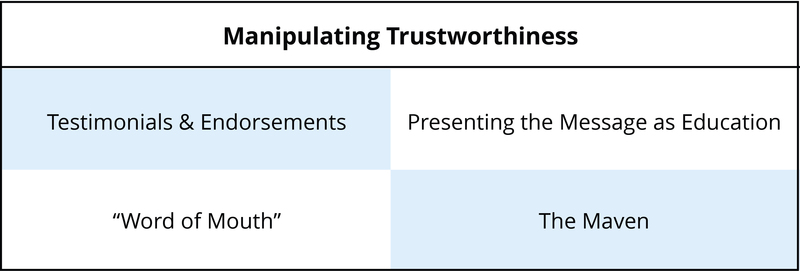Persuasion
Persuasion has been defined as “the process by which a message induces change in beliefs, attitudes, or behaviors”.
This is actually SUPER IMPORTANT. It’s all Marketing. Surprised I am learning this in Psychology.
https://nobaproject.com/textbooks/paul-wehr-new-textbook/modules/persuasion-so-easily-fooled
Two routes to persuasion:
- Central route (direct)
- Peripheral route (indirect)
The Source of Persuasion: The Triad of Trustworthiness
Manipulating the Perception of Trustworthiness
The perception of trustworthiness is highly susceptible to manipulation. Levine lists some of the most common psychological strategies that are used to achieve this effect:

I know the first 3, but what is maven?
Maven: More persuasive yet, however, is to involve peers face-to-face. Rather than over-investing in formal advertising, businesses and organizations may plant seeds at the grassroots level hoping that consumers themselves will then spread the word to each other. The seeding process begins by identifying so-called information hubs—individuals the marketers believe can and will reach the most other people.
The 7 Tricks of Persuasion
These are really important to understand
- “Free Gifts” & Reciprocity
- Social Proof
- Commitment and Consistency Foot in the Door
- A Door in the Face
- “And That’s Not All”
- The Sunk Cost Trap
- Consider the advice of billionaire investor Warren Buffet: “When you find yourself in a hole, the best thing you can do is stop digging
- Scarcity & Psychological Reactance
How to protect yourself against persuasion?
The most commonly used approach to help people defend against unwanted persuasion is known as the “inoculation” method.
Research has shown that people who are subjected to weak versions of a persuasive message are less vulnerable to stronger versions later on, in much the same way that being exposed to small doses of a virus immunizes you against full-blown attacks.
A more aggressive version of this technique that they refer to as “stinging”. Researchers pointed out to participants how gullible they were in being influenced by advertisements. As a result the participants were less affected by ads.
Ask yourself: Why do you feel this way?